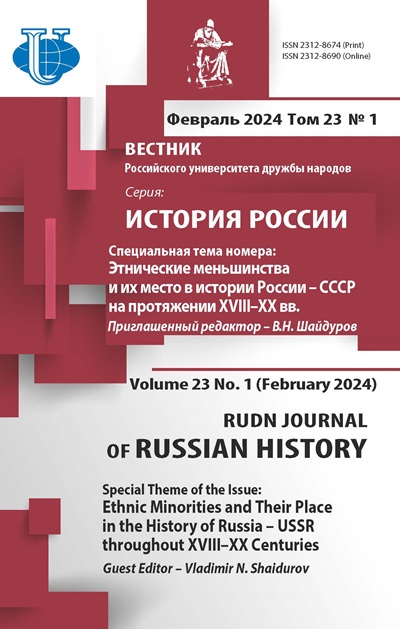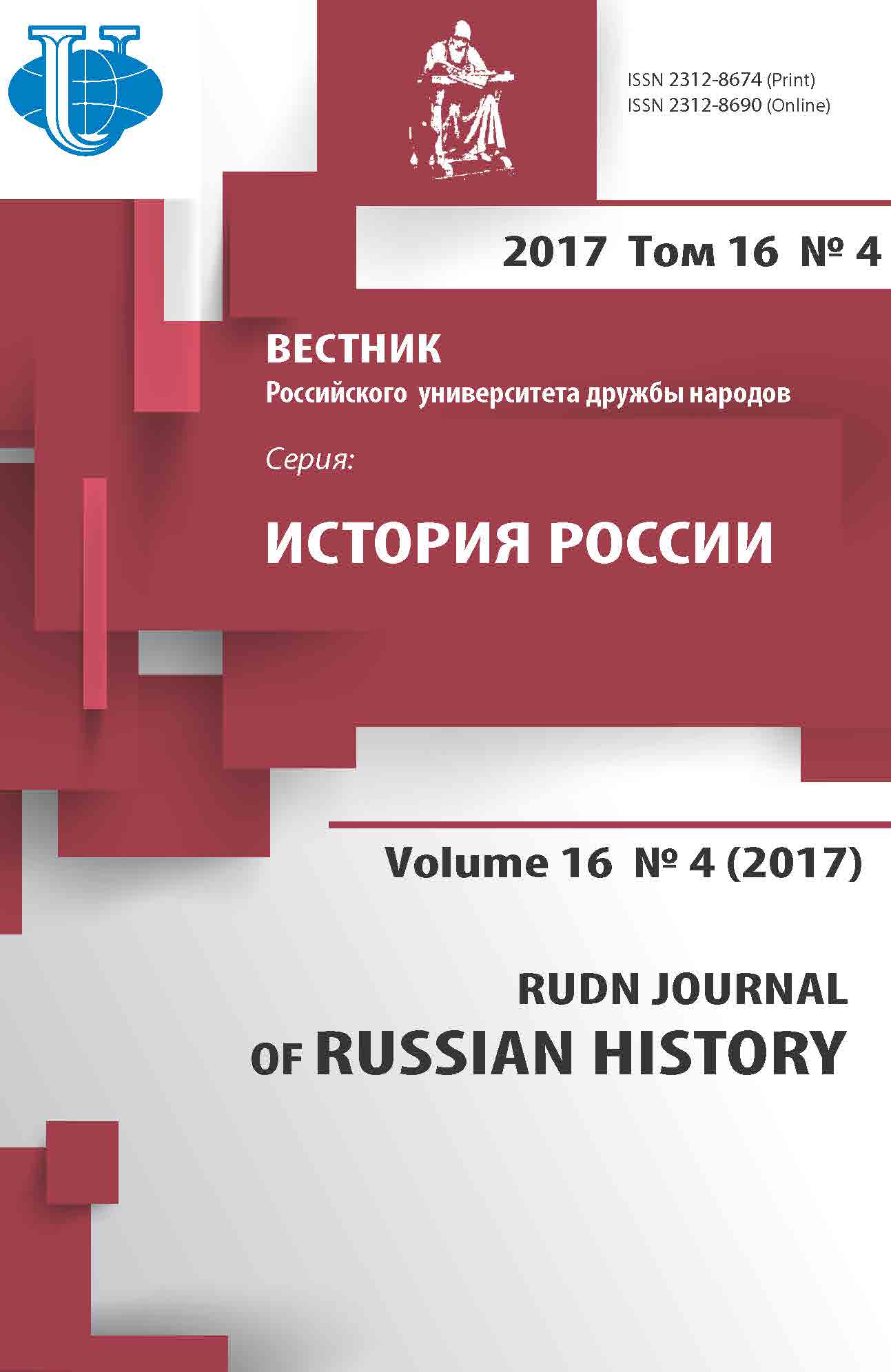CONCEPTUAL DIMENSION OF CONTEXT OF USING SOVIET CITEZENS’ LABOUR IN THE NAZI GERMANY ECONOMY (1941-1945)
- Authors: Garazha N.A1
-
Affiliations:
- Novorossiysk branch of the Financial University under the Government of the Russian Federation
- Issue: Vol 16, No 4 (2017)
- Pages: 656-669
- Section: ARTICLES
- URL: https://journals.rudn.ru/russian-history/article/view/17464
- DOI: https://doi.org/10.22363/2312-8674-2017-16-4-656-669
Cite item
Full text / tables, figures
Abstract
The article considers the offi cial and personal characteristics and thoughts concerning the conceptual component of the phenomenon of using thelabour of Soviet people in the Third Reich economy. There were formulated the basic concepts, which characterize all the stages of the use of labour of eastern workers. The results of the research showed that the refl ection on the analysis of the new posi-tion was typical of eastern workers regardless of their gender, age or social characteristics. It took a key place in their conversations and texts on a par with the discussions of house-hold burdens.At the same time, the feelings of Ostarbeiters and their thoughts about the fundamental changes in life were refl ected in the desire of the adequate defi nition of their position, the concise formulation of the major aspects of the German authorities’ and civilians’ attitude towards them, as well as their own perception of the new life. Being convinced of the fairness of the servile nature of the use of Soviet people’s labour, the population of Germany naturally enriched their vocabulary by the concepts of “owner”, “buy”, etc.It also caused a whole range of emotions of Ostarbeiters. Despite the challenges that the Soviet people faced while working in Germany, this harsh experience couldnot break their faith in themselves, in the human and humanity; it strengthened their spirit, and the ability to focus on the positive emotions and getting pleasure from small events helped them to survive.From the point of view of evaluation features, the socio-cultural connotations and ma-nipulative potential of the conceptual fi eld of the phenomenon of using Soviet people’s labour in the Third Reich economy were characterized by integrity and by diversity at the same time.
About the authors
Nataliia A Garazha
Novorossiysk branch of the Financial University under the Government of the Russian Federation
Author for correspondence.
Email: ngarazha@yandex.ru
Nataliia A. Garazha, PhD (in History), Associate Professor, Head of the Department of Informatics, Mathematics and Humanities Sciences, Novorossiysk branch of the Finance University under the Government of the Russian Federation (Novorossiysk, Russia).
56 Vidova St., Novorossiysk, 353900, RussiaReferences
- Kozellek R. K voprosu o temporal’nyh strukturah v istoricheskom razvitii ponjatij [On the question of temporal structures in the historical development of concepts]. Istoriya ponyatii, istoriya diskursa, istoriya mentaliteta [History of concepts, history of discourse, history of mentality]. Moscow: Novoe literaturnoe obozrenie. 2010: 21−34 (in Russian).
- Herbert U. Forced Laborers in the Third Reich: An Overview. International Labor and Working-Class History. 2000; (58): 192−218.
- Spoerer M, Fleischhacker J. Forced Laborers in Nazi Germany: Categories, Numbers, and Survivors. Journal of Interdisciplinary History. 2002; xxxiii: 2, Autumn: 169−204.
- Polian PM. Sovetskie grazhdane v Reikhe: skol’ko ikh bylo [Soviet citizens in the Reich: how many they were]. Sotsiologicheskie issledovaniia. 2002; (5): 95−100 (in Russian).
- Piliavec’ RІ. Robіtniki z Ukraїni v nacists’kіj Nіmechchinі: pitannja termіnologії, pravovogo ta socіal’nogo statusu. Vіjna. Okupacіja. Pam’jat’. Primusovі robіtniki z Ukraїni v okupovanіj Єvropі. Materіali Vseukraїns’koї naukovoї konferencії, m. Kiїv, 27 veresnja 2012 r. Kiev: SPC «Ppriorities», 2012: 88−125 (in Ukranian).
- Pastushenko T. Ostarbaiteri z KiЇvshchini: verbuvannya, primusova pratsya, repatriatsiya (1942−1953). Kiev: Institutional of History of Ukraine, 2009 (in Ukranian).
- Holland HH. Materialien zur Geschichte der Zwangsarbeiter in Herten. Herten, 2002.
- McDowell L. Cultural memory, gender and age: young Latvian women’s narrative memories of war-time Europe, 1944 – 1947. Journal of Historical Geography. 2004; 30: 701–728.
- Grinchenko GG. Оsobennosti rekonstrukcii proshlogo v svidetel’stvah byvshih ostarbajterov. [Features of the reconstruction of the past in the testimony of former Ostarbeiters]. Storinki voennoi istorii Ukraini: Zb. nauk. st. Kiev: Іnstitut іstorії Ukraїni. NAN Ukraїni, 2004; 8 (1): 52−58 (in Russian).
- Zemskov VN. K voprosu o masshtabah ljudskih poter’ SSSR v Velikoj Otechestvennoj vojne (v poiskah istiny) [To the question of the scale of the Soviet Union’s losses in the Great Patriotic War (in search of truth)]. Mir i politika. 2012; 5 (68). Available from: http://mir-politika.ru/301-lyudskiepoteri.html [Accessed 27 June 2016].
- Grieger M. Zwangsarbeit in einem Industrieunternehmen der Deutschen Arbeitsfront (DAF). Lager, Zwangsarbeit, Vertreibung und Deportation: Dimensionen der Massenverbrechen in der Sowjetunion und in Deutschland 1933 bis 1945. Essen: Klartext-Verl., 1999: 391−582.
- Krasnozhenova EE. Sotsial’naya pomoshch’ sem’yam voennosluzhashchikh v Nizhnem Povolzh’e 1941−1945 gg. [Social assistance to families of servicemen in the Lower Volga region, 1941−1945]. Voprosy istorii. 2012; (3): 141−147 (in Russian).
- Skripnichenko YuF. «Ostarbaiterstvo» na Har’kovshhine v gody Vtoroi mirovoi voiny: rassmotrenie problemy perioda konca ХХ–ХХI stoletiia v istochnikah i istoriografi i [«Ostarbayterstvo» in the Kharkiv region during the Second World War: the consideration of the problem in the period of the late twentieth and twenty-fi rst century in sources and historiography]. Pskovskii voenno-istoricheskii vestnik. 2015; (1): 189−193 (in Russian).
- Eichholtz D. Geschichte der deutschen Kriegswirtschaft 1939−1945. Band I: 1939−1941. Berlin: Akademie verlag; 1971.
- Liedke K. Das KZ-Außenlager Schillstraße in Braunschweig 1944−1945. Braunschweig; 2006.
- Grinchenko G. (Re)Constructing Suffering: «Fascist Captivity» in Soviet Commemorative Culture. Cuadernos de Historia Contemporánea. 2013; 35: 243–261.
















